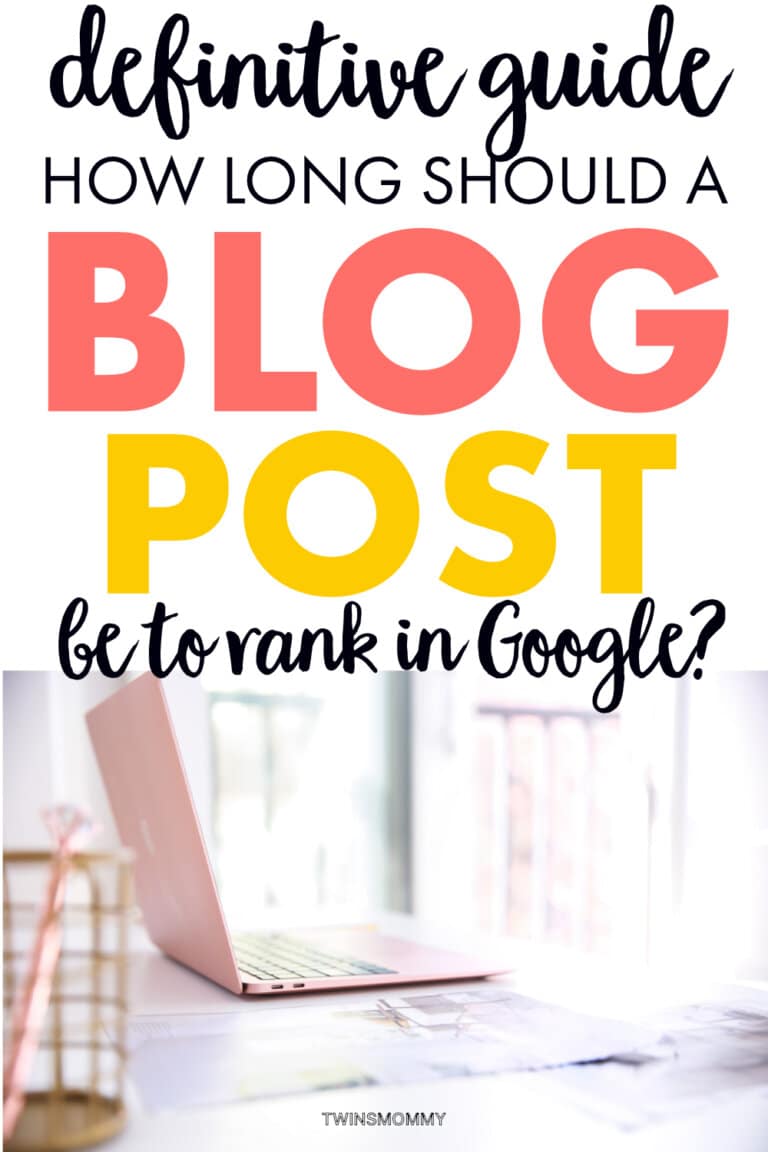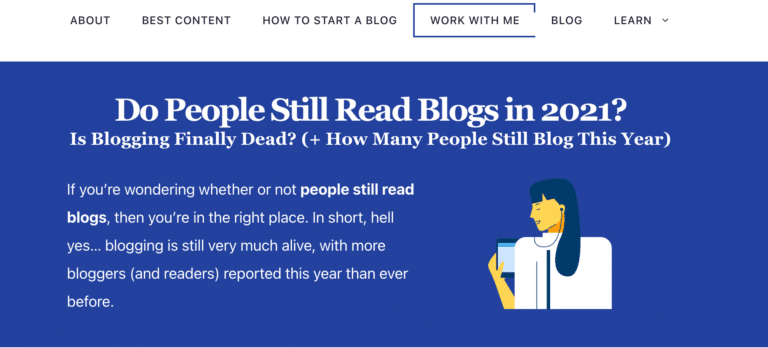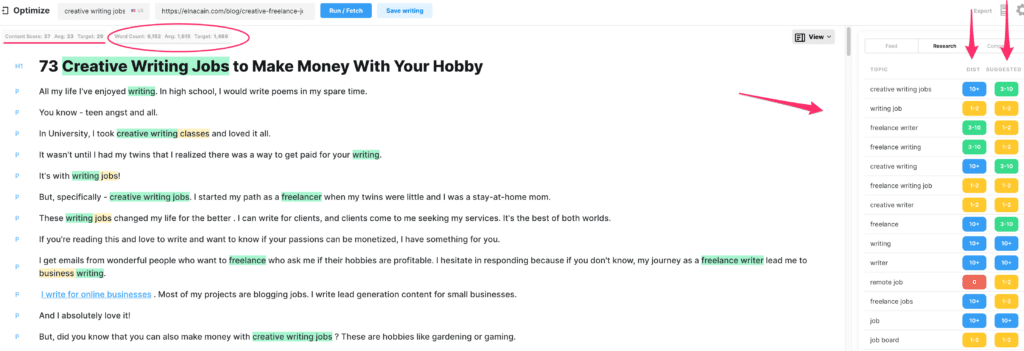It’s happened to all bloggers…
You sit there staring at the blank screen trying to figure out what to write.

Then you wonder…how long should a blog post be?
It’s no problem for you to write an entire book on your blog post topic.
Or…maybe you’re struggling to even get 200+ words down.
And, do you HAVE to write long-form blog posts to succeed as a blogger?
Well, the answer on how long your blog post needs to be is…
As long as it needs to be.
There are pros and cons to both long and short blog posts.
In this post (which will be about 2000 words in case you’re wondering) I will cover how long your posts should be and compare the ROI (rate on return) on both long and short blog posts.
Where to Start With Writing Blog Posts
For 2021, blog writing starts with a keyword idea.
Way back in the infancy of the internet and blogging, there was a black hat strategy called keyword stuffing.
If you wanted to be the first spot on the search engines, all you had to do was put your keyword into your post a couple hundred times in between some fluff.
There was no regard for readability and actually providing value to your reader, just as long as you got Google ranking and ad income.
Well, Google got smart and that meant changes in priorities.
If Google finds that you are keyword stuffing, your blog post and possibly your entire blog will be de-valued. And in 2021, value, along with EAT (expertise, authoritativeness and trustworthiness) reign online.
But what does this have to do with how long a blog post should be?
In today’s blogging world, you need to strike a balance between how many keywords you put into your post, the length, readability, and the value that you provide your reader.
And now, you have to contend with AI generated content and changing the writing landscape and how we write blog posts.
Providing Your Reader with Value
Google has gotten smarter and people have gotten busier and lazier.
Most people don’t have the time or motivation to read through a 10,000 word blog post.
Most likely they’ll just scroll through the post, watch a few seconds of a video, or even just scroll to the end of the post to catch the key points.
According to this study, most people follow an F-shaped pattern for reading content online.

This implies people are only causally looking at content in an F-shaped pattern, instead of reading each sentence.
If you can’t immediately catch your reader’s attention and let them know in 2.3 seconds that this post is going to solve their problem or in some way provide them value, then they will click away to the next shiny thing and forget what they were even looking for.
Consider Your Topic
What you are writing about is going to play into how long your blog post should be.
Often when people search certain questions, unless they are doing a deep dive into researching something, they want something quick and easy to read that will give them their answers yesterday.
So how can you be sure the right readers land on your blog post?
Focus on SEO
When it comes to the length of your blog post, HubSpot stresses that as long as you have a few key SEO strategies, you can get away with shorter posts.
Your posts should include:
- Images with alt tags
- Media rich content (such as videos and social links)
- Targeting the right keywords
- Proper backlinking
Even rather short posts (300-500 words) with effective SEO can get lots of traffic.
HubSpot also found that longer is better than shorter when the main goal of the post is lead generation. Having a longer post shows your authority in the space can showcase your knowledge to your potential customers.
Short Vs. Long Blog Posts
According to BlogTyrant, short blog posts should be at least 300 words in order to rank in the search engines at all. Longer posts of 1,000 words or more will, more often than not, outrank shorter posts.
For a long time bloggers thought that the longer the blog post the better, you know, due to that keyword stuffing thing.
Generally speaking, search engines like longer posts.
According to CoSchedule, longer posts get more backlinks than shorter posts on similar topics.
However, even Neil Patel, states that, “There is no single, standard length threshold that shows a consistent and conclusive correlation with better ranking, higher ratings, more shares, longer dwell time, lower bounce rates, etc.”
However, Neil Patel also says, “longer posts usually perform better on every level.”
CoSchedule also states that longer posts might rank better just because of the time researching that the writers put into them and the quality of the writing.
Another advantage to longer blog posts is the sheer value of content (ie: keywords and related keywords) that you can include in the post.
When you do your keyword research, you aren’t just writing for that one specific keyword, you should be writing for a set of keywords and questions that people type into search engines to try and capture as much of that algorithm as possible.
However, in 2021, Marie Haynes mentioned in her podcast that Google is favoring blog posts with the answer immediately revealed and is short form.
So, what does this mean? It means, if possible, answer the user’s search query in the first sentence or paragraph of your blog post.
This is something Ryan Robinson does with his blog content.

So, what should you do?
Well, as a freelance writer, I’m all for long-form blog posts.
I actually enjoy long form blog posts and most ranking content online is long-form. But, as Google is updating constantly, it’s looking at user behavior and how users find information as a way to help Google serve up the best information.
From these findings, it loos like a lot of people want to know the answer right away and they can decide after if it’s worth reading.
For my content, I haven’t used Ryan Robinson’s method of giving the answer in the first paragraph of my blog posts, but my content continues to rank. Only time will tell on whether or not this will be the norm to writing blog posts.
When to Write Long-Form Blog Posts
Depending on the source, long-form content is anything over 1,000 words. Various niches also let themselves better to longer content.
For example, home and garden posts are on average about half the length of financial articles. Tech and gadget posts are significantly shorter than marketing posts.
According to Expresswriters, long-form content is best used for these situations:
When Building Pillar Content
Your pillar content are those articles that take a deep-dive and provide the base on what all other content on your site is based on.
The are also the main categories on your blog.
Outranking the Competition
One SEO tactic to outrank your competition by outwriting them. If you can create longer posts and include more related keywords or answer questions the readers have than the top ranking posts, your post could potentially rank.
I use a tool called Marketmuse to help me with adding more keywords and outwriting the competition.

It’s Necessary for the Topic
While you can easily answer some questions with a shorter blog post, some topics just require a lot longer post.
While, “how to knit a blanket,” might be a 500 word post, “how to start knitting as a beginner,” is going to be a lot longer as there are more steps and other subtopics to be addressed.
The Content is Buyer-Centric
Different lengths and types of content work better for buyers at certain stages.
The further along in the buyer’s journey, the longer the content they are going to want to read.
Why?
Because at later stages of the buyer journey, people need more information to make sure they want to buy what you are promoting.
You’re Building Authority
People with a lot of knowledge to share that are building their authority through content marketing use long-form content to increase their expertise, authority, and trustworthiness in the eyes of Google.
Over time, when Google sees you provide thorough material, training and resources through long-form content, Google will see you as the authority in your niche industry.
Keys to a Quality Blog Post (No Matter the Length)
We already went over what a good blog post needs to have in terms of SEO if you want to rank in the search engines.
But what are some of the other keys to a high quality post that will keep your reader’s eyes glued to your content?
1. Easy Blog Post Readability
Short posts are easy to read. A heading here, a couple bullet points there.
Longer posts, on the other hand, can be much more difficult to keep the reader’s attention.
Some of the ways to increase readability of your posts (and keep visitors on your page) are to break up the text with a good amount of headings and subheadings and create a lot of white space in between your sentences.
Bold certain keywords, related keywords, or phrases to be sure to catch the reader’s eye.
Your paragraphs and sentences should be short and easy to read. Be sure that you aren’t stuffing a bunch of difficult to read keywords or inserting unnecessary hyperbole to instill and occupy your reader and ensure they take note of your thesis.
See what I did there…
Man that hurt to write that…much less read it!
2. Your Blog Post is Filled With Value
Whether your reader is scrolling through to capture your key points or is reading every word, they should walk away with value.
You should answer their question, solve their problem, make them laugh, give them an “aha” moment, or provide value to them in some way.
This might be hard for beginner bloggers since this type of content is usually packaged up into pillar content and long-form content, but you can start with resource posts or list posts.
These are easier to create and are filled with tons of value. For more help on those types of posts, check out Ready Set Blog for Traffic.
3. Your Blog Post is Authoritative and Accurate
As a writer, your audience looks to you for reliable and accurate content.
Whether you feel like it or not, people will view you as an authority on the topic you are writing about.
So, as the blogger, you need to be that authority figure.
Give your audience accurate information from other reliable sources. When other writers and businesses view you as an authority, they will link back to your content, thus further driving your authority.
I don’t know about you, but I trust blogs that have credible sources or that share a journey or story with case studies and findings.
On Twins Mommy I mostly do the latter – share my experience and finding in the digital marketing world. My recent example is my manual Pin tactic.
4. When Writing a Blog Post, Emulate Others
If you are still struggling to figure out how long your particular blog post should be, check out what others are doing.
While doing your keyword research, look at the top posts on that topic and see how long their blog posts are.
There is a nifty little extension called Word Counter Plus that you simply highlight the text and right click to find out the word count.
If you are writing a post on, “how to train a puppy,” you can use this tool to figure out how long the other top blog posts for this topic are.
If they are all around 2,000-2,500 words, then you should keep your post within that range.
The Final Verdict
Don’t overthink word count.
Write a good blog post post that feels natural, isn’t stuffed with fluff and unnecessary keywords, that gets your point across, that your readers will gain value from.
There is no magical word count to get your post to rank #1.
However, according to content marketing educator Julia McCoy, 2,500 seems to be the sweet spot for social shares and rank potential on Google.
So, what do you think? How long are your blog posts and what is your ROI for that content? I’d like to hear your thoughts!
Please pin me!




2 Comments